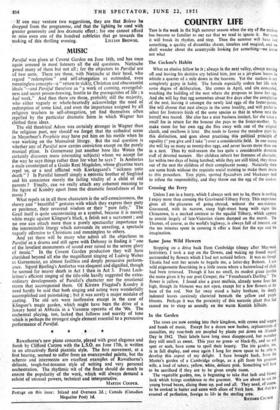The Cuckoo's Habits
What an elusive fellow he is ; always in the next valley, always mosing off and leaving his derisive cry behind him, just as a jet-plane leaves its whistle a quarter of a mile down in the heavens. Yet the cuckoo is not completely gypsy in habit. The female especially orders her life with some degree of deliberation. She comes in April, and sits concealed, watching the building of the nest where she proposes to leave her egg. And she will lay that egg somewhen about five days after the completion of the nest, leaving it amongst the newly laid eggs of the foster-parent. She will choose that nest always in the same locality, and will prefer to select for fosterers birds of the same species as that in whose nest she herself was reared. She also has a nice business instinct, for she takes a small fee in return for the honour she pays to the foster-mother. To make room for her own egg she flies away with one of the original clutch, and swallows it later. She tends to favour the meadow pipit for this distinction, and goes about practising this political principle of equality (" you give and I take ") over a considerablefield. In one season she will lay as many as twenty-five eggs, and never leaves more than one in a nest. Thus by mid-season she has quite a considerable domestic staff of devoted nannies Her children inherit her firmness of character, for within two days of being hatched, while they are still blind, they throw out of the nest the children of their complacent nanny. Naturally there are some birds without the requisite social training to make them docile to this procedure. Tree pipits, spotted flycatchers and blackcaps tend to refuse the responsibility, and they throw out the egg of the cuckoo.


















































 Previous page
Previous page